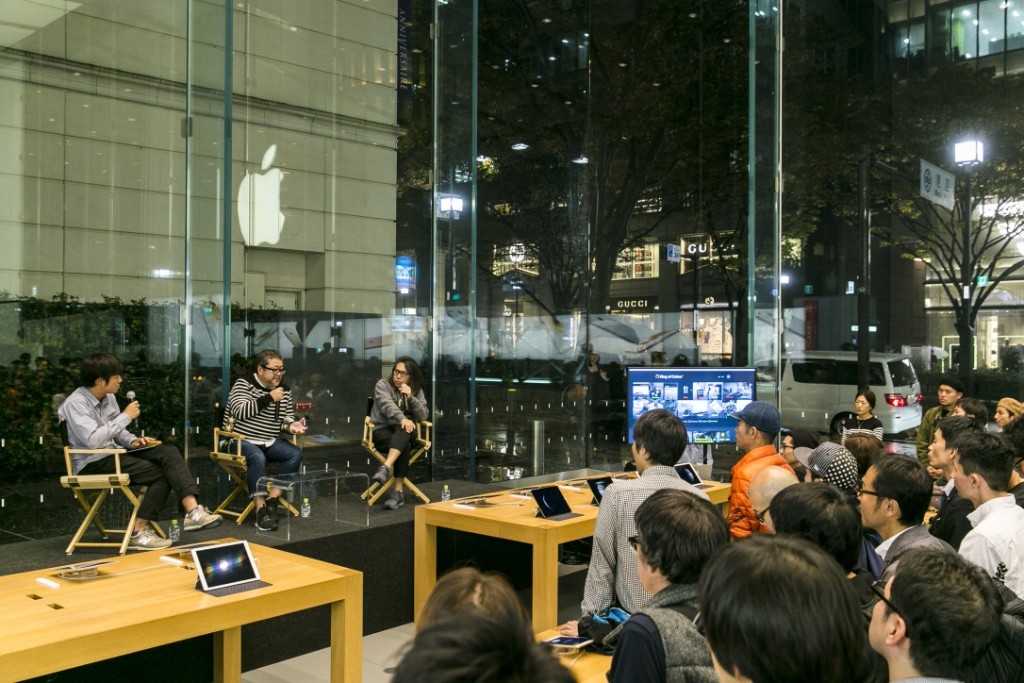Talking About the Future of Digital Media : 1
2015年11月18日、アップルストア表参道にて、「デジタルメディアの未来」をテーマにしたトークイベントが開催された。登壇者は、藤原ヒロシのほか、クリエイティブディレクターの梶原由景と、エディター・ライターの榎本一生。テクノロジーが進化し、SNSの普及が進むなかで、デジタルメディアはこれからどのような変化を遂げていくのか? 今後のデジタルメディアのあり方とは? 当日のディスカッションの内容を全文書き起こしでレポートする。
Photo_Apple Store, Omotesando (c) Kensuke Tomuro | Text_RoC Staff

壇上右から、藤原ヒロシ、梶原由景(クリエイティブディレクター)、榎本一生(エディター・ライター)
藤原:こんばんは。今日はデジタルメディアの未来についてお話をしようと思っていますが、まずはその前に、デジタルメディアの過去、そして現状がどうなっているのか、すこしお話をしたいと思います。
デジタルメディアに欠かせないテクノロジーがどう進化してきたのか、考えてみましょう。僕たちがいま生きているなかで、一番テクノロジーの進化を感じることって何でしょう? 一人暮らしでも家に帰ったらロボットが話しかけてくれる、とか? みなさん何を感じますか? そこの方、どうですか?
(会場):希望と恐怖を感じます。ロボットに支配されるんじゃないかと。
藤原:……僕が思っていた答えとは全然違いますね(笑)。テクノロジーの進化に関して、一番わかりやすいのは、“物が小さくなること”。たとえば、音楽で言うと、もともと録音技術がなかった時代は、ホールに行ったりライブに行ったり、実際にその場に足を運ぶ必要がありました。それがある日、30cmのレコード盤となって家庭にやってきて、その後12cmのCDになり、MP3になり、そしていまや何もかたちがない物になった。そのように、大きな物が小さくなっていくのがテクノロジーの進化です。
では、メディアの進化とは何か。新聞からどんどん小さくなって、いまではiPhoneで最新のニュースが読める。そして、物が小さくなっただけでなく、スピードも速くなっている。昔は情報を伝達するために、飛脚が手紙を持って走っていたのが、郵便が発達したり、メールが普及したりして、いまや届けたい情報が一瞬で届けられるようになった。最近だと、パリのテロがあったとき、朝刊を見てみたら、何もそのことが書かれていない。みんなが話していることと新聞で書かれている情報にすごくタイムラグがあるなあと改めて感じました。
さて、いまいろいろなデジタルメディアがあると思うのですが、僕らにとってどういうメディアが面白いのか、今日はこれから3人で話し合いたいと思います。梶原くんと榎本くんに来てもらいました。よろしくお願いします。
梶原・榎本:よろしくお願いします。
藤原:いまのデジタルメディアには良い点や悪い点がいろいろあると思うのですが、どうですか?
榎本:デジタルメディアとひと口に言っても、ウェブマガジンもあれば、雑誌や新聞がやっているオフィシャルのメディアもあるし、あるいはバイラルメディアとか、キュレーションメディアとか、いろいろなかたちがありますよね。僕はもともと雑誌の人間で、その延長線上としてウェブマガジンなどの仕事をしているのですが、ウェブマガジンに関してはまだまだ試行錯誤の段階というか、これが正解というやり方はないかなという気がしています。そのときどきのテクノロジーの進化にあわせて、最適化しながらやっている感じです。
藤原:どう? 梶原くんは。
梶原:僕はあまり電子書籍とかには積極的ではなくて、雑誌も本も紙であることの利点がまだまだ結構あると思ってます。ランダムにアクセスできるとか、目的のページを探しやすいとか、軽いとか。でも最近、雑誌の定額配信サービスを利用しているのですが、わざわざ買うまでもなかったり立ち読みするまでもなかったりする雑誌が読めるメリットを結構感じています。あれはあれで面白いなと。iPad Proのような大画面で見るとさらに読みやすい。
藤原:あとスピード感ですね。スピード感に関しては、紙の雑誌はデジタルメディアにはかなわない。スピードが速いことはすごく良いことだと思います。
いわゆるウェブマガジンに関しては、3、4年くらい前まで、ほぼ100%に近いくらい“一方通行”で、こちらが作り上げたものをみんなで読むようなものでした。それがフェイスブックやツイッターといったSNSの普及によって、みんなでひとつのものを共有して情報をハンドルしていくみたいな“参加型”になっていった。どう? 榎本くんはフェイスブックとか使う?
榎本:使ってはいますが、ちょっと距離を置いているのが正直なところです。ヒロシさんもそうですよね?
藤原:僕はフェイスブックとインスタグラムをやっていますが、そういったSNSと、そうじゃないメディア、たとえばハニカムとかのブログなんかは、明らかに違うものと捉えています。
榎本:僕は古い人間だからかもしれませんが、やっぱり情報の信頼性に関しては、いわゆる旧来型のメディアのほうが頼りになる。先日も梶原さんとそんな話をしたばかりなのですが。
梶原:信頼性に関しては、メディアの特性云々というよりも、そこで働く人の層がまだまだ紙のほうが分厚い。ナレッジが蓄積されていて、信頼の置けるソースもあるし。もちろんそれは紙の出版社の方々がデジタルのものを手掛けるときも同じこと。あと、ネット発のメディアは、基本的に無料だったり、料金が安かったりするので、製作側があまりお金を使えないという事情もあるかなと。
藤原:お金の話で言うと、最初にテクノロジーの進化のところで話しましたが、もともとライブでしか聞けなかった音楽がレコードやCDで聴けるようになり、どんどん小さくなった末にデータになって、物自体がなくなるということは、そこから得られる収入がどんどんなくなっていく。ということは、“テクノロジーの進化=芸術性の退化”につながっていく気がして。それは非常に駄目な部分かなと。
音楽に関して言うと、話は逸れますが、この前、フランク・オーシャンのマネージャーが日本に来ていて、ちょっとお茶をして話したのですが、彼は村上隆さんの展覧会を観た後だったんですね。村上さんもアーティストで、フランクもアーティスト。村上さんは世界中で展覧会をやり、フランクは世界中でライブをやる。村上さんはポスターを売り、フランクはCDを売る。ただ、村上さんの場合はひとつのマスターピースに1億、10億もの値段がつくけれど、フランクの場合は1曲が1億、10億の値段がつくことはない。そこが大きく違うので、これからは新しいやり方を考えていかなければいけないなという話をしていました。
梶原:音楽の定額配信も、基本的に一律いくらで、そのなかの配信された割合に応じて枠があるとか。でも枠が小さいと。
藤原:そうなんですよ。“割合”になった途端に、ライバルはビートルズやエルビス・プレスリーになるんですよ。だから新しく出てくる人ほどお金を生むのが大変という構図になる。まあ、今日はお金云々の話をする場ではないので(笑)、話を戻しましょう。
- Keywords:
- Apple


